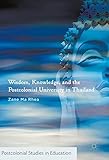Wisdom, Knowledge, and the Postcolonial University in Thailand [electronic resource] / by Zane Ma Rhea.
Material type: TextSeries: Postcolonial Studies in EducationPublisher: New York : Palgrave Macmillan US : Imprint: Palgrave Macmillan, 2017Description: XVII, 266 p. 10 illus. in color. online resourceContent type: text Media type: computer Carrier type: online resourceISBN: 9781137376947Subject(s): Education | Philosophy and social sciences | School management and organization | School administration | Educational sociology | Higher education | Education -- Philosophy | Social sciences | Education and sociology | Sociology, Educational | Education | Sociology of Education | Higher Education | Educational Philosophy | Philosophy of Education | Administration, Organization and Leadership | Social Sciences, generalAdditional physical formats: Printed edition:: No titleDDC classification: 306.43 LOC classification: LC189-214.53Online resources: e-book Full-text access
In:
Springer eBooksSummary: This book examines Thai knowledge and wisdom from the perspective of postmodern, postcolonial globalization. Ma Rhea explores the ways in which the Thai university system attempts to balance old knowledge traditions, Buddhist and rural, with new Thai and imported knowledge. It traces the development of Thai university partnerships with outsiders, focusing on the seventy year relationship between Thailand and Australia. In comparison, it analyses the old Thai Buddhist wisdom tradition and in the final chapters proposes its worthiness as a pedagogical pathway for universities globally.
TextSeries: Postcolonial Studies in EducationPublisher: New York : Palgrave Macmillan US : Imprint: Palgrave Macmillan, 2017Description: XVII, 266 p. 10 illus. in color. online resourceContent type: text Media type: computer Carrier type: online resourceISBN: 9781137376947Subject(s): Education | Philosophy and social sciences | School management and organization | School administration | Educational sociology | Higher education | Education -- Philosophy | Social sciences | Education and sociology | Sociology, Educational | Education | Sociology of Education | Higher Education | Educational Philosophy | Philosophy of Education | Administration, Organization and Leadership | Social Sciences, generalAdditional physical formats: Printed edition:: No titleDDC classification: 306.43 LOC classification: LC189-214.53Online resources: e-book Full-text access
In:
Springer eBooksSummary: This book examines Thai knowledge and wisdom from the perspective of postmodern, postcolonial globalization. Ma Rhea explores the ways in which the Thai university system attempts to balance old knowledge traditions, Buddhist and rural, with new Thai and imported knowledge. It traces the development of Thai university partnerships with outsiders, focusing on the seventy year relationship between Thailand and Australia. In comparison, it analyses the old Thai Buddhist wisdom tradition and in the final chapters proposes its worthiness as a pedagogical pathway for universities globally.
| Item type | Current library | Collection | Call number | Copy number | Status | Notes | Date due | Barcode |
|---|---|---|---|---|---|---|---|---|
| E-Books | MEF eKitap Kütüphanesi | Springer Nature | LC189 -214.53 (Browse shelf (Opens below)) | Available | NATURE | 1420024-1001 |
This book examines Thai knowledge and wisdom from the perspective of postmodern, postcolonial globalization. Ma Rhea explores the ways in which the Thai university system attempts to balance old knowledge traditions, Buddhist and rural, with new Thai and imported knowledge. It traces the development of Thai university partnerships with outsiders, focusing on the seventy year relationship between Thailand and Australia. In comparison, it analyses the old Thai Buddhist wisdom tradition and in the final chapters proposes its worthiness as a pedagogical pathway for universities globally.
5
